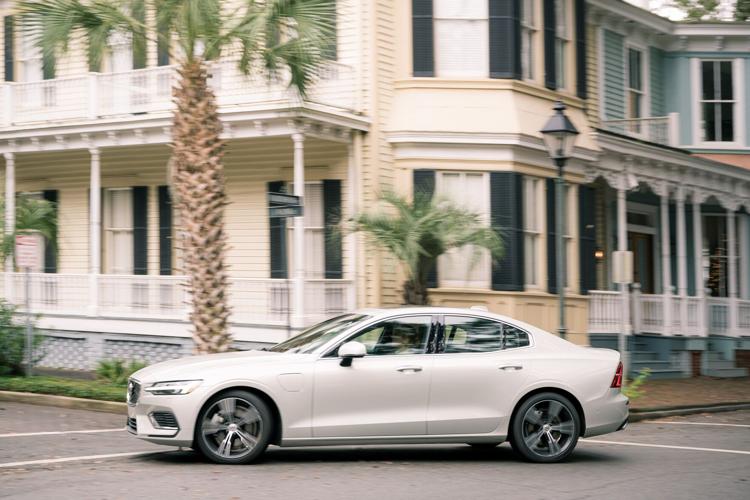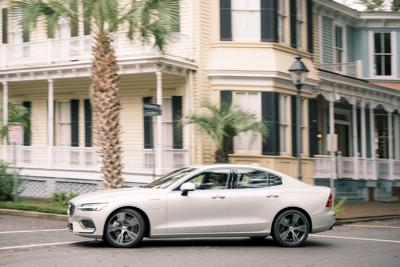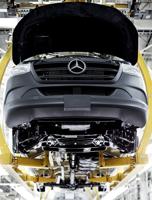The transition to an all-electric model lineup by 2030 has the Volvo Cars campus near Ridgeville looking to more than double its production capacity as it and other South Carolina automakers are embracing a gasoline-free future.
Volvo's $1.1 billion South Carolina plant has built S60 sedans since late 2018, and will add the automaker's most popular model — the XC90 luxury SUV — to its assembly line in 2023. Work has already started to bring global production of the full-size SUV to the plant, which is building an on-site electric battery factory to power its cars.
Anders Gustafsson, president and CEO of Volvo Cars USA, says the 1,500-worker Lowcountry plant will experience an unprecedented growth spurt in coming years as the automaker phases out vehicles powered by combustion engines in favor of electrified cars by the end of this decade.
"We have had 100 percent growth (in the U.S.) the last five years, and we are planning for another 100 (percent) in the upcoming years," Gustafsson told Yahoo Finance last week. He added the South Carolina plant will transition from its current low production rate of sedans "to the highest capacity ever in the U.S. market."

Anders Gustafsson is president and CEO of Volvo Cars USA. File/Grace Beahm Alford/Staff
That means the 1,600-acre Berkeley County campus will need more resources and workers, especially those proficient in digital technologies.
"We need to double our size of the operation right now ... really triple the size of the operation," Gustafsson said of the Ridgeville site.
Accelerated timeline
The Palmetto State's other vehicle makers are taking note of the electric-powered trend.
Mercedes-Benz Vans, which builds Sprinter commercial vans in North Charleston, said it will start building an eSprinter for the U.S. market because more customers are demanding climate-friendly vehicles. Online retailer Amazon, one of the van manufacturer's biggest customers, says strict emissions laws being passed in many states are driving the market away from combustion engines.
BMW, the state's largest automaker with 11,000 employees at its Spartanburg County plant, hopes to boost sales of its all-electric and hybrid vehicles this year. The Upstate site's two most popular plug-in hybrids — the X3 xDrive30e and the X5 xDrive45e — sold a combined 47,212 units last year, or 13 percent of the Greer factory's total production.
The plant has assembled batteries for electric vehicles since 2015 and spent $10 million to expand its now 86,000-square-foot battery hall two years ago.
"We want to increase sales of our electrified vehicles by more than half in 2021," Pieter Nota, a member of BMW's management board, said in a statement in January. "This underlines the importance of electromobility as a major growth driver for our company."
No automaker has taken a more ambitious approach to electrification than Volvo. The Swedish company, owned by China's Geely Holding Group, has estimated that half of the cars it builds for the global market by 2025 — or roughly 350,000 — will be fully electric and all of its new vehicles by 2030 will run on battery power. That's a faster timeline than any other major automaker.

A Volvo Cars employee works in the automaker's battery assembly plant in Belgium. Volvo said last week all new cars it produces by 2030 will be powered by electricity. Volvo Cars/Provided
"Electric is where the growth is for the premium part of the market," Lex Kerssemakers, Volvo's head of commercial operations, said at a news conference last week.
In the first two months of this year, fully electric or plug-in hybrids accounted for 26.6 percent of Volvo's global sales — more than 29,000 cars.
The company built its first fully electric vehicle, the XC40 Recharge SUV, in 2020, and last week marked the debut of the C40 Recharge coupe, which will be made in Belgium starting in the fall. The next all-electric Volvo will be a new-generation XC90 to be built in Ridgeville.
Higher expectations
The auto industry's move toward electrification has taken on new urgency under President Joe Biden, who "has raised expectations that the United States will offer the kind of incentives that helped make electric cars the fastest-growing segment of the European market last year," according to a report by The New York Times.
Volvo acknowledged its shift is based on expected legislation that will tighten climate standards while rewarding companies that meet low- or no-emission goals. The automaker also said it expects "a rapid expansion of accessible high-quality charging infrastructure" will accelerate consumer acceptance of fully electric cars.
The number of public charging ports has nearly quadrupled since late 2017 to about 96,500 at the end of last year, according to the EVadoption.com website.
U.S. sales of plug-in light-duty electric vehicles totaled 296,000 units in 2020. While that was down significantly from 331,000 sales in 2019, analysts blame the coronavirus pandemic for the slump. Platts Analytics predicts electric-vehicle sales in the U.S. will top the 1 million mark by 2025 and total 3 million units by 2030. Currently, the U.S. is the world's third-largest market for electric vehicles, behind China and Europe.
Volvo has said it will spend about 5 percent of annual revenue, which totaled $31.2 billion last year, on research and development, particularly of electrified vehicles.
"I am totally convinced there will no customers who really want to stay with a petrol engine," Volvo CEO Hakan Samuelsson said during a news conference last week. "We are convinced that an electric car is more attractive for customers."

Volvo Cars says all of its vehicles, including the new C40 Recharge unveiled last week, will be powered by electricity by 2030. The automaker builds its S60 sedan at a $1.1 billion manufacturing campus near Ridgeville. Volvo Cars/Provided
Gustafsson said the West Coast represents the biggest market for Volvo's electric vehicles, but consumer demand in the South and Northeast has exceeded expectations.
"We see, by far, higher demand and support for electrification," he said. "That was one of the ingredients in being so bold with the numbers."
Analysts say Volvo's longstanding commitment to safety will help the automaker make its case for what most see as another worthy cause — a healthier environment.
"Volvo's reputation for safety may help overcome potential concerns some drivers might have over safety of electric vehicles," Stephanie Brinley, principal automotive analyst for IHS Markit, told Forbes magazine.
"Leadership in electric vehicles and in efficient vehicles dovetails nicely with Volvo's conservative brand image, building on a longer history of corporate citizenship which respects community and environment," Brinley said. "Valuing safety and also valuing care for the environment are concerns that can go together for customers."

















